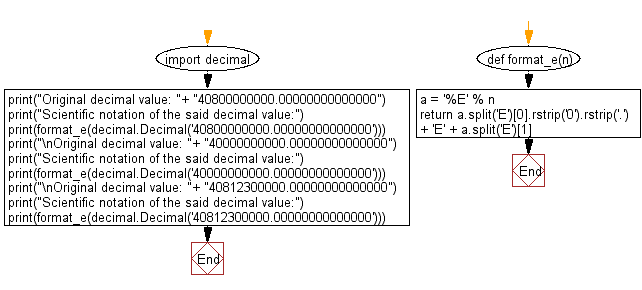Python: Display a given decimal value in scientific notation
7. Scientific Notation Display
Write a Python program to display a given decimal value in scientific notation. Use decimal.Decimal
Sample Solution:
Python Code:
import decimal
#Source: https://bit.ly/2SfZEtL
def format_e(n):
a = '%E' % n
return a.split('E')[0].rstrip('0').rstrip('.') + 'E' + a.split('E')[1]
print("Original decimal value: "+ "40800000000.00000000000000")
print("Scientific notation of the said decimal value:")
print(format_e(decimal.Decimal('40800000000.00000000000000')))
print("\nOriginal decimal value: "+ "40000000000.00000000000000")
print("Scientific notation of the said decimal value:")
print(format_e(decimal.Decimal('40000000000.00000000000000')))
print("\nOriginal decimal value: "+ "40812300000.00000000000000")
print("Scientific notation of the said decimal value:")
print(format_e(decimal.Decimal('40812300000.00000000000000')))
Sample Output:
Original decimal value: 40800000000.00000000000000 Scientific notation of the said decimal value: 4.08E+10 Original decimal value: 40000000000.00000000000000 Scientific notation of the said decimal value: 4E+10 Original decimal value: 40812300000.00000000000000 Scientific notation of the said decimal value: 4.08123E+10
Flowchart:

For more Practice: Solve these Related Problems:
- Write a Python program to convert a given Decimal value to scientific notation and print the result using the format specifier 'E'.
- Write a Python function that accepts a Decimal value and returns its scientific notation representation as a string.
- Write a Python script to generate a list of Decimal values and then print each value in scientific notation with a fixed number of significant figures.
- Write a Python program to format a Decimal value in scientific notation and compare the output with the built-in format() function’s scientific format.
Go to:
Previous: Write a Python program to configure the rounding to round to the nearest, with ties going to the nearest even integer.
Next: Python built-in Modules Exercise Home.
Python Code Editor:
Have another way to solve this solution? Contribute your code (and comments) through Disqus.
What is the difficulty level of this exercise?
Test your Programming skills with w3resource's quiz.
